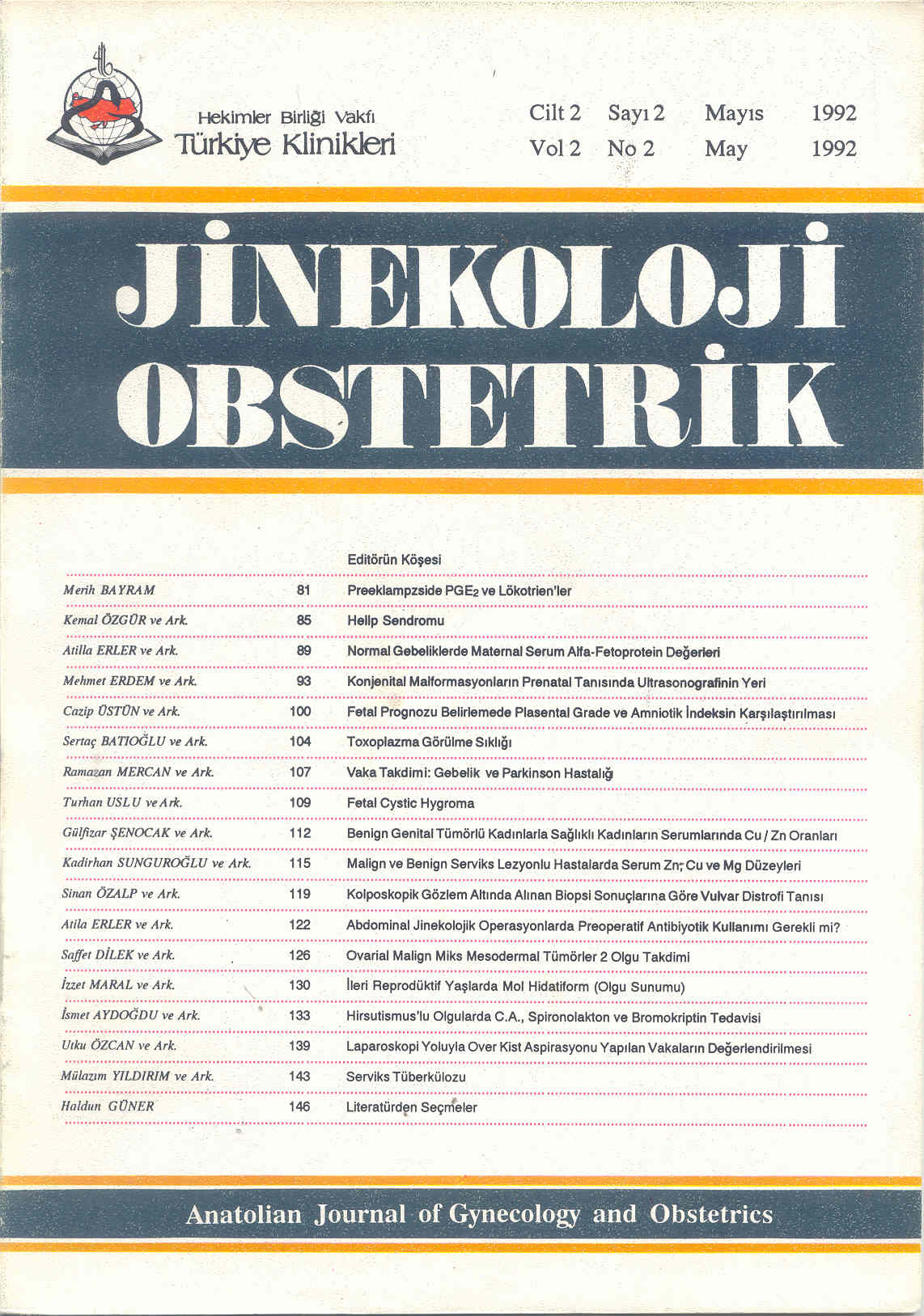Open Access
Peer Reviewed
ARTICLES
3300 Viewed1652 Downloaded
The Role Of Ultrasonography In The Prenatal Diagnosis Of Congenital Malformations
Konjenital Malformasyonların Prenatal Tanısında Ultrasonografinin Yeri
Turkiye Klinikleri J Gynecol Obst. 1992;2(2):93-9
Article Language: TR
Copyright Ⓒ 2025 by Türkiye Klinikleri. This is an open access article under the CC BY-NC-ND license (http://creativecommons.org/licenses/by-nc-nd/4.0/)
ÖZET
Bu çalışmada, konjenital malformasyonların prenatal tanısında ultrasonografinin yerinin gösterilmesi için kliniğimizde Kasım 1989-Mayıs 1991 arasında doğum yapmış antenatal takipli 1719 gebeye ait toplam 2811 ultrasonografik inceleme (ortalama 1.63 inceleme) retrospektif olarak değerlendirildi. 432 gebede (%25.1) sadece II. Trimestirde ve 805 gebede (%45.5) sadece III. Trimestirde ultrasonografik inceleme yapılmışken 506 gebenin hem II, hem de III. Trimestirde ultrasonografik incelemesi mevcuttu. Ultrasonografik olarak 24 gebede major fetal anomali saptanırken, klinik doğum kayıtlarından 30 major (%1.74) ve 10 minor (%0.58) anomali tespit edildi. Elde ettiğimiz verilerden, kliniğimizde yapılan antenatal ultrasonografinin konjenital malformasyonların saptanmasında sensitivitesi %79.31, spesifitesi %99.94, pozitif belirleyici değeri %95.83 ve negatif belirleyici değeri %99.64 olarak bulundu. Bu sonuçlar, ultrasonografinin konjenital anomali taraması amacıyla antenatal bakımda rutin olarak kullanılmasının gerekliliğini göstermektedir.
Bu çalışmada, konjenital malformasyonların prenatal tanısında ultrasonografinin yerinin gösterilmesi için kliniğimizde Kasım 1989-Mayıs 1991 arasında doğum yapmış antenatal takipli 1719 gebeye ait toplam 2811 ultrasonografik inceleme (ortalama 1.63 inceleme) retrospektif olarak değerlendirildi. 432 gebede (%25.1) sadece II. Trimestirde ve 805 gebede (%45.5) sadece III. Trimestirde ultrasonografik inceleme yapılmışken 506 gebenin hem II, hem de III. Trimestirde ultrasonografik incelemesi mevcuttu. Ultrasonografik olarak 24 gebede major fetal anomali saptanırken, klinik doğum kayıtlarından 30 major (%1.74) ve 10 minor (%0.58) anomali tespit edildi. Elde ettiğimiz verilerden, kliniğimizde yapılan antenatal ultrasonografinin konjenital malformasyonların saptanmasında sensitivitesi %79.31, spesifitesi %99.94, pozitif belirleyici değeri %95.83 ve negatif belirleyici değeri %99.64 olarak bulundu. Bu sonuçlar, ultrasonografinin konjenital anomali taraması amacıyla antenatal bakımda rutin olarak kullanılmasının gerekliliğini göstermektedir.
ANAHTAR KELİMELER: Ultrasonografi, konjenital anomali
ABSTRACT
To identify the accuracy of ultrasonography for prenatal detection of congenital malformations, we evaluated retrospectively a total of 2811 sonograms of 1719 patients (mean sonogram 1.63 for each patient), who were delivered in our clinic from November 1989 to May 1991. 432 patients (25.1%) had only one scan in the 2nd trimester, 805 patients (45.5%) had only one 3rd trimester scan, and 506 patients (29.4%) had more than one scan both in 2nd and 3rd trimesters. In the study period, a major congenital malformation was detected by ultrasonography in 24 patients, whereas, 30 major (1.74%) and 10 (0.58%) minor congenital malformations were defined in the delivery records. With these data, we found the sensitivity specificity, positive and negative predictive values of prenatal ultrasound examinations, performed in our clinic, to detect congenital malformations, to be 79.31%, 99.94%, 95.83% and 99.64%, respectively. These results show the importance of ultrasonography, to be a routine performance, for screening congenital malformations, prenataly.
To identify the accuracy of ultrasonography for prenatal detection of congenital malformations, we evaluated retrospectively a total of 2811 sonograms of 1719 patients (mean sonogram 1.63 for each patient), who were delivered in our clinic from November 1989 to May 1991. 432 patients (25.1%) had only one scan in the 2nd trimester, 805 patients (45.5%) had only one 3rd trimester scan, and 506 patients (29.4%) had more than one scan both in 2nd and 3rd trimesters. In the study period, a major congenital malformation was detected by ultrasonography in 24 patients, whereas, 30 major (1.74%) and 10 (0.58%) minor congenital malformations were defined in the delivery records. With these data, we found the sensitivity specificity, positive and negative predictive values of prenatal ultrasound examinations, performed in our clinic, to detect congenital malformations, to be 79.31%, 99.94%, 95.83% and 99.64%, respectively. These results show the importance of ultrasonography, to be a routine performance, for screening congenital malformations, prenataly.
MENU
POPULAR ARTICLES
MOST DOWNLOADED ARTICLES





This journal is licensed under a Creative Commons Attribution-NonCommercial-NoDerivatives 4.0 International License.










